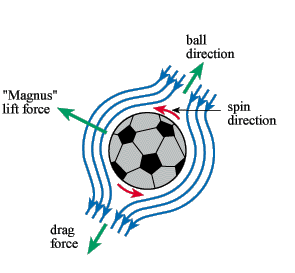How to Bend the Ball: Magnus
Force

One of the most interesting things about the
game of soccer to someone that is watching it
played for the first time is the phenomenon that
a person can make the ball "Bend" in mid air.
When watching this for the first time, it is
actually quite mind boggling how a ball can not
only move vertically through the air, but also
move with horizontal motion as well. Let's take
a look at the Physics behind this concept:

source:
http://www.sciencedaily.com/releases/2014/06/140619210631.htm
The Magnus Force
The main force responsible for "bending" a
ball's trajectory (displacing the ball out of
it's vertical plane) is called the Magnus Force.
This is named after the German physicist
Heinrich Gustav Magnus in 1853. Magnus
discovered that the difference in speeds on
either side of a spinning ball relative to the
air caused the ball to deflect out of it's
vertical plane of motion and "bend."

source:
http://www.unc.edu/~lwander/Group%20Project.html
As you can see from the image above, the ball is
spinning about an axis that is perpendicular to
the direction of the airflow that is streaming
across it. As stated in the June 1, 1998 edition
of the Physics World magazine, "The air travels
faster relative to the center of the ball where
the periphery of the ball is moving in the same
direction as the airflow. This reduces the
pressure, according to Bernoulli's principle.
The opposite effect happens on the other side of
the ball where the air travels slower relative
to the center of the ball. There is therefore an
imbalance in the forces and the ball deflects"
(Asal, Akatsuka, Haake).
This Magnus Force can be calculated just like any
other force in Physics. The general formula
for this force is:
Fm=S(w x
v)
where w is the angular
velocity of the object, and v is the velocity
of the object in the direction of motion. S is
dependent upon the drag coefficients across
the object.
|